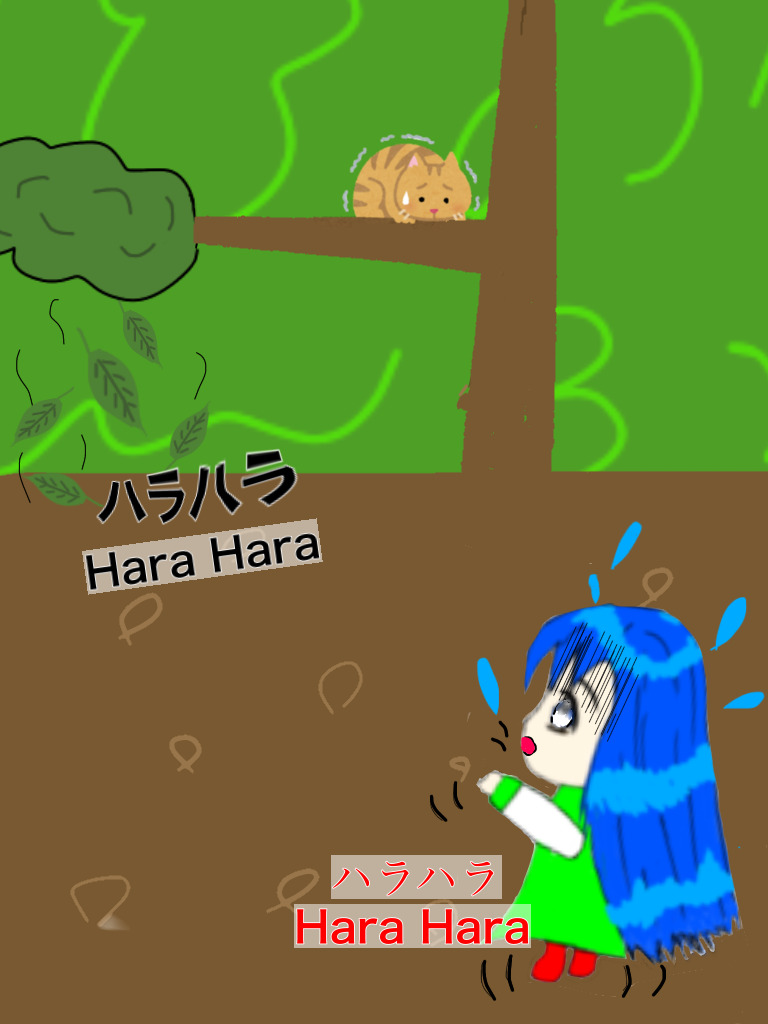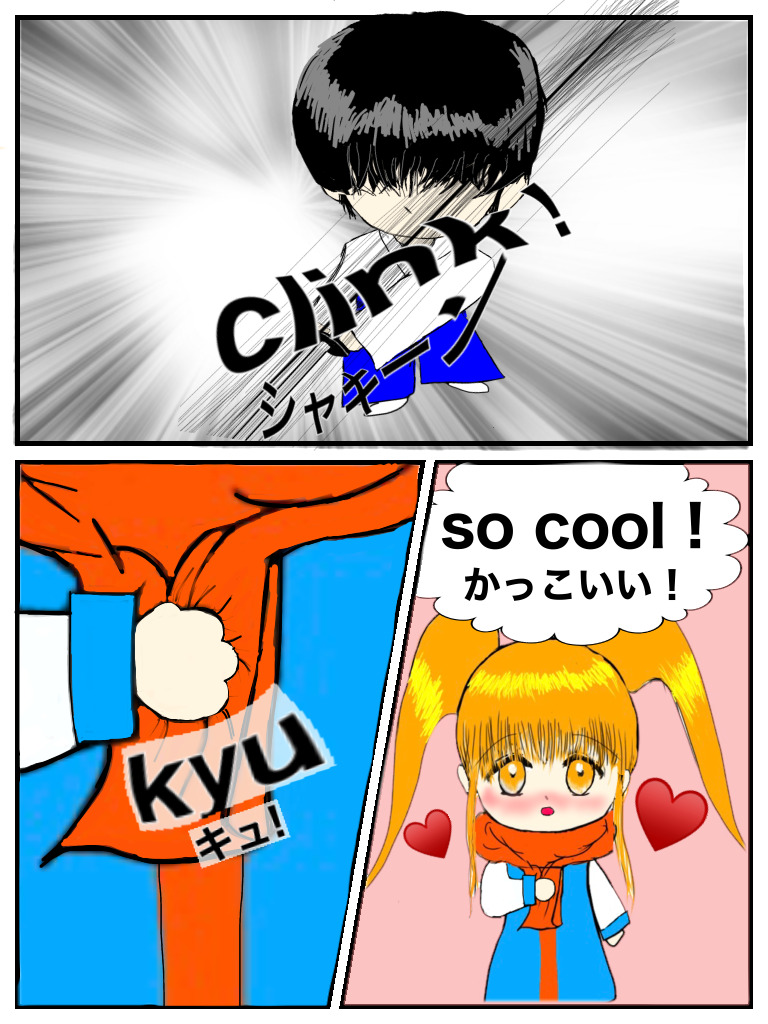
In English, there are a lot of expressions about “My heart is pounding” situation. I’m very interested in them.
In Japanese, we use various onomatopoeias depending on the situation.
I collected Japanese phrases about “My heart is pounding” situation
Japanese translation(日本語訳)
英語では、「ドキドキする」状況についてたくさんの表現があります。私はそれらにとても興味を持っています。
日本語では、状況によって色々な擬態語を使い分けています。
「ドキドキする」状況の日本の言葉を集めました。
Doki Doki
In most situations, we can use this word when we feel heart beat fast.
If you can’t come up with other words, you can convey your feeling(“My heart is pounding!”) with this word.
For your imformation, this word comes from a sound of heart beating.
Ex. “Doki Doki suru”meanings ※”suru” means “to do”.
- My heart is pounding.
- My heart is thumping.
- My heart is racing.
- My heart is beating.
- My heart flutters.
- I have butterflies in my stomach.
Japanese “Doki Doki” applies to all these words.
Japanese translation(日本語訳)
多くの場面で心が高鳴るときにこの言葉を使うことができます。
もし、他の言葉が思いつかないときは、この言葉で(心が高鳴る)感情を伝えることができます。
ちなみに、この言葉は、心臓が高鳴る音から来ています。
日本語の「ドキドキ」は、これら(リストの表現)すべての言葉が当てはまります。
Waku Waku
In positive situations, we use this word when we are so excited (expected, happy) that we can’t sit still.
However, in negative situations, we don’t use this.
For your imformation, “Waku” has two meanings in Japanese, “to rise up” and “to boil”. “Waku Waku” is the combination of two meanings, I mean, “Emotion like boiled water is rising up, so we can’t sit still.”
In Japanese anime “SPY✖FAMILY”, Anya often says “Waku Waku”.
It is exactly this word.
Ex. (We use this word as below.)
“Waku Waku suru”=I’m so excited that I can’t sit still.
Japanese translation(日本語訳)
前向きな状況で、すごく興奮していて(期待して、うれしくて)じっとしていられないときにこの言葉を使います。
でも、否定的な状況では使いません。
ちなみに、「わく」は日本語で「湧く」と「沸く」の2つの意味があって、「ワクワク」は2つの意味をかけ合わせたものになっています。つまり、「熱湯のような感情が沸き上がってくる」ということです。
日本のアニメの「スパイファミリー」でアーニャがよく「ワクワク」と言います。
それがまさにこの言葉です。
Hara Hara
We use this word when we have a mental state such as getting anxious.
On the other hand, this word is also used in the situation the leaves flutter down.
Please show the picture below.
A girl is anxicious that the cat may fall down like the leaves flutter down.

Ex. (We use this word as below.)
“Hara Hara suru”=It makes me anxious watching that.
“Konoha ga Hara Hara ochiru”=The leaves flutter down.
※Konoha=leaves , ga(subject marker) , ochiru=fall , Hara Hara ochiru=flutter down
Japanese translation(日本語訳)
心配で気をもんでいるような精神状態のときにこの言葉を使います。
一方、葉っぱが落ちる時にも使われます。
絵をご覧下さい。
女の子は猫が落ちるのではないかと心配しています。葉っぱがハラハラ落ちるように。
Kyun
In the most situations, we use this word as feeling for someone.
Although there are various English translations about this word, I think Japanese word “Kyun” means heart beat fast for a moment. So, perhaps the word showing feeling only for a moment is suitable.
Also,”Kyun” comes from “Mune Kyun”.
“Mune” in Japanese means “a chest” in English.
In Japan, It is thought that this feeling rises up from one’s heart.
Therefore, “Heart-throb” is more similar than any other word, I think.

This picture’s scene is a typical “Mune Kyun” situation.
She is holding her chest.
This onomatopoeia holding her chest is represented as “Kyu”.
To leave us with an allusive feeling, “n” is added to the end of phrase, and The word “Kyun” was made….I think.
Actually, “Mune Kyun” and “Kyun” is obsolete in Japan, but the word “Kyun to suru” is still used.
The girl in the picture above is doing “Kyun to suru”.
※be doing “Kyun to suru” =”Kyun to siteiru” in Japanese
Japanese translation(日本語訳)
多くの場合、この言葉は恋愛感情で使います。
この言葉の英訳は様々ありますが、「キュン」という言葉は、一瞬の胸の高鳴りを意味すると思います。だから、一瞬だけの感情を示す言葉がふさわしいのではないでしょうか。
また、「キュン」は「胸キュン」から来ています。
日本語の「胸」は英語の”a chest”です。
日本ではこの感情は心臓からくるものと考えられています。
このようなことから、他の言葉よりも”Heart-throb”がより近い意味なのではないかと思います。
この絵の状況は、典型的な「胸キュン」の状況です。
彼女は胸をつかんでいます。
胸をつかむ効果音は「キュ」で表現されています。
余韻を残すために、「ン」が言葉の最後に付け加えられて、「キュン」になったのだ…と思います。
実際、「胸キュン」や「キュン」は死語ですが、「キュンとする」は今もなお使われています。上の絵の女の子は「キュンとしている」わけです。
In the end(最後に)
I have taught English to junior high school students for twenty years, but it is textbook English.
Since I’d like to learn real English, A part of this, I wrote this article. So, I’m sorry if there are mistakes.
Japanese translation(日本語訳)
私は20年間、中学生に英語を教えてきましたが、それは教科書英語です。本当の英語を学びたいので、その一環としてこの記事を書きました。
だから間違っている所もあると思いますがご容赦ください。


コメント